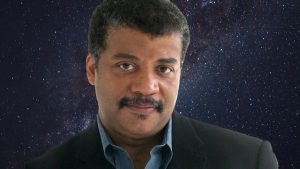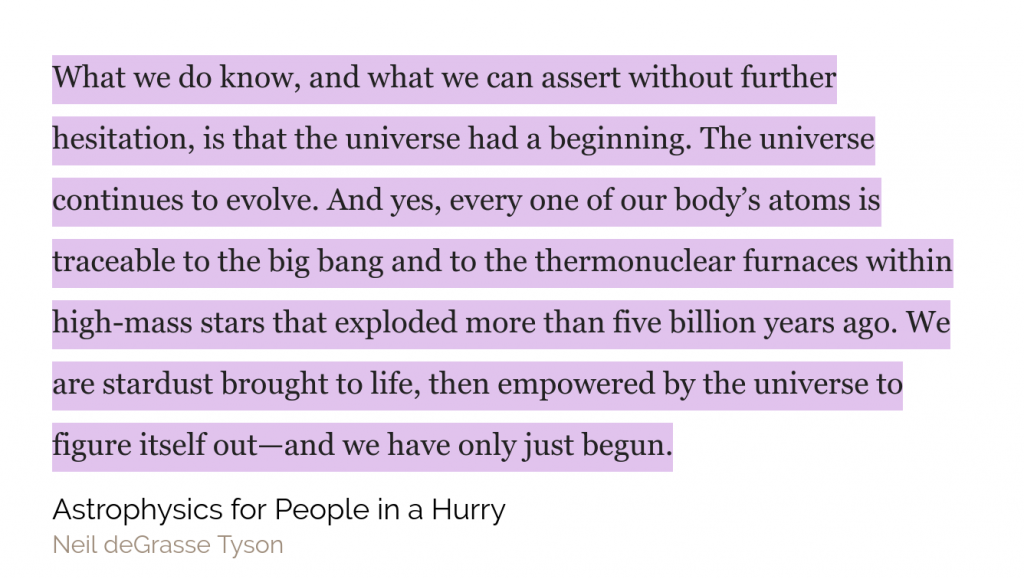About Neil deGrasse Tyson
Neil deGrasse Tyson is an American astrophysicist, cosmologist, planetary scientist, author, and science communicator.

He hosted the television series Cosmos: A Spacetime Odyssey, a successor to Carl Sagan‘s 1980 series Cosmos: A Personal Voyage.
The quote “We are stardust” is from his book, Astrophysics for People in a Hurry that was published in 2017.
We are Stardust Quote
What we do know, and what we can assert without further hesitation, is that the universe had a beginning.
The universe continues to evolve.
And yes, every one of our body’s atoms is traceable to the big bang and to the thermonuclear furnaces within high-mass stars that exploded more than five billion years ago.
We are stardust brought to life, then empowered by the universe to figure itself out – and we have only just begun.
Neil deGrasse Tyson, Astrophysics for People in a Hurry

Meaning of ‘We are Stardust’
Humans have developed an observer-observed view of the world. We perceive the world as out there, while we are somewhere inside our body.
We consider ourselves as independent of the world out there with us objectively watching events unfolding in the world.
Humans don’t exist independent of this universe
Neil deGrasse Tyson quite beautifully says ‘We are stardust’ bought to life by the universe so that the universe can figure itself out. We are made of the elements created in the fires burning at the heart of stars and share these elements as other planets, asteroids and other bodies in this universe. We are don’t have an independent existence, but are one element of this beautiful universe.
Human view of independent existence creates Duality (or Man vs. Nature conflict)
Duality is the source of conflict between Man and Nature.
James Carse considers nature as the realm of the unspeakable and that we experience this unspeakability of nature through its utter indifference to human culture.
This creates a nature vs. man conflict that is the source of some of the greatest literature – The Old Man and the Sea by Ernest Hemingway, Moby Dick by Herman Melville or The North Water by Ian McGuire.
We take nature as an opponent to be subdued for the sake of civilization. Our language perpetuates this conflict by saying we conquer mountains or space. We presume to speak for nature.
Nature does have a voice, and its voice is no different from our own.
We can then presume to speak for the unspeakable.Our great skill lies in finding patterns of repetition under the apparent play of accident and chance.
There is an irony in our silencing of the gods. By presuming to speak for the unspeakable, by hearing our own voice as the voice of nature, we have had to step outside the circle of nature.
It is one thing for physics and chemistry to be speaking about nature; it is quite another thing for physics and chemistry to be speaking of nature.
No chemist would want to say that chemistry is itself chemical, for our speaking cannot be both chemical and about chemistry.
If speaking about a process is itself part of the process, there is something that must remain permanently hidden from the speaker.
To be intelligible at all, we must claim that we can step aside from the process and comment on it “objectively” and “dispassionately” without anything obstructing our view of these matters.
– James Carse, Finite and Infinite Games
Nature allows no master over itself.
“Nature, to be commanded, must be obeyed.”
– Francis Bacon
If we must obey to command, then our commanding is only obeying and not commanding.
As our understanding of the universe at Quantum level increases, we realize that what we read in nature is actually what we have read into nature.
“We have to remember that what we observe is not nature in itself but nature exposed to our method of questioning.”
– Heisenberg
Consciousness creates Reality
All literature about the ultimate Truth, Awakening, or Non-Duality points to the same thing – that there are no two (man vs. nature), only one. That our consciousness creates our reality.
THE basic perennial principle behind all religions (before they were corrupted by interpretations and formal rituals) was the same: the existence of a Reality, by whatever name called – Reality, Totality, Consciousness, God or whatever – which never did not exist from the beginning of the human race.
This Reality, which the first human being must have experienced, is the awareness of BEING – I AM – before any thought could have occured.
This reality – I AM – got clouded through subsequent thinking based on the feeling of a personal identity.
The presence or absence of the sense of personal doership and achievement would thus seem to be the dividing line between the happening of the experience of Reality or its not happening.
What is the one single basis of the perennial principle? It is this: all there is, is Consciousness – impersonal Consciousness in the awareness “I am” – other than which nothing exists.
– Ramesh Balsekar, The Bhagvad Gita: A Selection
It is clear to me (intellectually, not via direct experience) that:
1. The ultimate reality (or Truth) is nothingness.
2. The reality we think we ‘see’ is virtual reality. We create this virtual reality by focusing our consciousness or attention.
3. Our sense of ‘self‘ and ‘personal doership‘ is the cause of our misery.
The best course is to experience this ‘virtual’ world created by our mind with curiosity and spontaneity.
Read More Like This
- Finite and Infinite Games by James Carse
- The Bhagvad Gita: A Selection by Ramesh Balsekar
- Spiritual Enlightenment: The Damnedest Thing by Jed McKenna
Recent Articles

